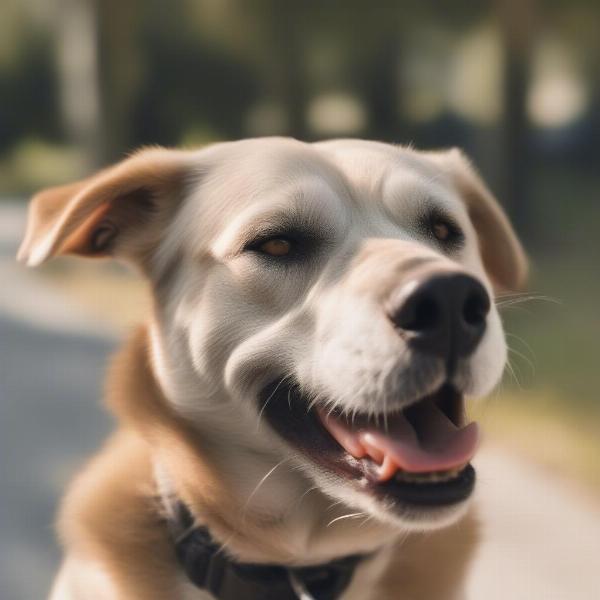Old dog panting can be concerning for owners. While panting is a normal way for dogs to regulate their body temperature, excessive or unusual panting in older dogs can sometimes indicate an underlying health issue. This article will explore the common reasons for old dog panting, when to be concerned, and how to help your senior canine companion stay comfortable.
Why is My Old Dog Panting?
 Old Dog Panting Normally
Old Dog Panting Normally
Panting is a natural process for dogs, helping them cool down by evaporating moisture from their tongues and lungs. However, several factors can cause increased panting in older dogs, ranging from normal age-related changes to more serious health problems. It’s important to understand the difference between normal and abnormal panting to ensure your furry friend receives the appropriate care.
Common Causes of Old Dog Panting
Pain and Discomfort
As dogs age, they are more prone to conditions like arthritis, which can cause significant pain and discomfort. older dog is panting a lot can be a sign of pain, especially if accompanied by other symptoms like limping, stiffness, or reluctance to move.
Respiratory Issues
Older dogs are also more susceptible to respiratory problems such as heart disease, lung disease, and tracheal collapse. These conditions can make it difficult for dogs to breathe efficiently, leading to increased panting.
Cognitive Dysfunction Syndrome (CDS)
Similar to Alzheimer’s in humans, CDS can affect senior dogs, causing confusion, disorientation, and anxiety. These changes can trigger increased panting, especially in unfamiliar or stressful situations.
Medication Side Effects
Certain medications can also cause panting as a side effect. If your older dog recently started a new medication and you’ve noticed an increase in panting, consult your veterinarian.
“It’s crucial to remember that panting in older dogs shouldn’t be dismissed as simply ‘getting old’,” says Dr. Emily Carter, DVM. “A thorough veterinary examination is essential to rule out any underlying medical conditions.”
When to Worry About Old Dog Panting
While some panting is normal, excessive panting, especially if accompanied by other symptoms, warrants a trip to the vet. Look out for signs like:
- Labored breathing
- Blue or gray gums
- Weakness or collapse
- Coughing
- Excessive drooling
- Restlessness
Helping Your Panting Old Dog
If your old dog is panting, there are several things you can do to help:
- Ensure a Cool and Comfortable Environment: Provide access to shade, air conditioning, or fans. A cooling mat can also be helpful.
- Offer Fresh Water: Dehydration can exacerbate panting, so always ensure your dog has access to fresh, cool water.
- Reduce Stress and Anxiety: Create a calm and predictable environment for your senior dog. Avoid overwhelming situations and provide a safe space where they can retreat.
- Maintain a Healthy Weight: Obesity can put extra strain on an older dog’s respiratory and cardiovascular systems, contributing to panting.
Conclusion
Old dog panting can have various causes, ranging from normal age-related changes to serious health conditions. By understanding the potential reasons for panting and recognizing when to seek veterinary attention, you can help ensure your senior canine companion stays comfortable and healthy. Remember to consult with your veterinarian for a proper diagnosis and treatment plan.
FAQ
- Why is my old dog panting at night? old dog panting at night can be caused by pain, anxiety, or underlying medical conditions.
- Is panting in older dogs normal? Some panting is normal, but excessive or unusual panting should be investigated by a veterinarian.
- What can I do to help my older dog stop panting? Ensure a cool environment, provide fresh water, reduce stress, and maintain a healthy weight.
- When should I take my panting old dog to the vet? heavy panting in older dogs accompanied by other symptoms like labored breathing, blue gums, or weakness warrants immediate veterinary attention.
- Can pain medication help my old dog stop panting? If panting is caused by pain, pain medication prescribed by a veterinarian can help.
- Could my old dog’s panting be a sign of heart problems? Yes, panting can be a symptom of heart disease in older dogs.
- What is Cognitive Dysfunction Syndrome (CDS) and how does it relate to panting? CDS is a neurological condition that can cause anxiety and confusion, leading to increased panting. older dog panting at night
ILM Dog is a leading online resource for dog owners worldwide, providing expert advice on all aspects of dog care, from breed selection to senior dog care. We offer a wealth of information on dog health, training, nutrition, grooming, and more. We are committed to providing dog lovers with the tools and resources they need to provide their canine companions with the best possible care. For expert guidance, contact us via email at [email protected] or call us at +44 20-3965-8624. ILM Dog is here to help you and your furry friend thrive.